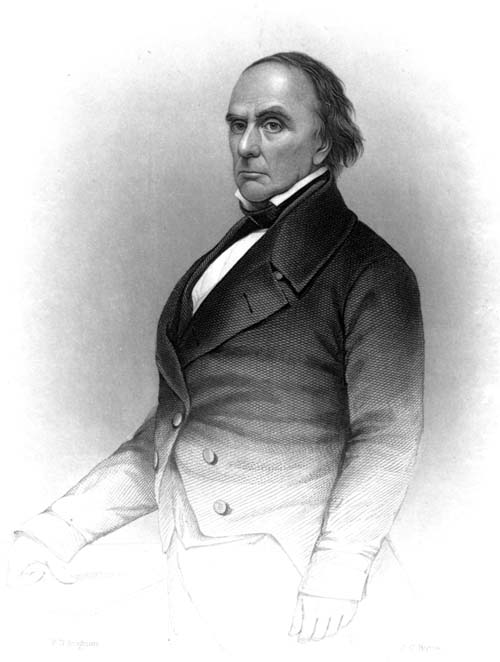Birthday of Daniel Webster - 1854 dated Americana
Inv# AM2363
State(s):
New York
Years:
January 18, 1854
119 page Booklet of the 72nd Anniversary of the Birthday of Daniel Webster celebrated by a number of his personal friends. Minor fox stains and paper loss.

Daniel Webster (January 18, 1782 – October 24, 1852) was an American statesman who represented New Hampshire and Massachusetts in the United States Congress and served as the United States Secretary of State under Presidents William Henry Harrison, John Tyler, and Millard Fillmore. He was also a prominent attorney, especially during the period of the Marshall Court. Throughout his career, he was a member of the Federalist Party, the National Republican Party, and the Whig Party.
Born in New Hampshire in 1782, Webster established a successful legal practice in Portsmouth, New Hampshire after undergoing a legal apprenticeship. He emerged as a prominent opponent of the War of 1812 and won election to the United States House of Representatives, where he served as a leader of the Federalist Party. Webster left office after two terms and relocated to Boston, Massachusetts. He became a leading attorney before the Supreme Court of the United States, winning cases such as Dartmouth College v. Woodward, McCulloch v. Maryland, and Gibbons v. Ogden. Webster returned to the House in 1823 and became a key supporter of President John Quincy Adams. He won election to the United States Senate in 1827 and worked with Henry Clay to build the National Republican Party in support of Adams. A leading American statesman during the nation's antebellum era. Webster first rose to regional prominence through his defense of New England shipping interests. His increasingly nationalistic views and the effectiveness with which he articulated them led Webster to become one of the most famous orators and influential Whig leaders of the Second Party System. As an attorney, Webster served as legal counsel in several cases that established important constitutional precedents that bolstered the authority of the Federal government. As Secretary of State, he negotiated the Webster-Ashburton Treaty that established the definitive eastern border between the United States and Canada. Primarily recognized for his Senate tenure, Webster was a key figure in the institution's "Golden Age." So well-known was his skill as a Senator throughout this period that Webster became a third and northern counterpart of what was and still is known today as the "Great Triumvirate," with his colleagues Henry Clay from the west and John C. Calhoun from the south. His "Reply to Hayne" in 1830 was generally regarded as "the most eloquent speech ever delivered in Congress." Similar to Henry Clay, Webster's desire to see the Union preserved and conflict averted led him to search out compromises designed to stave off the sectionalism that threatened war between the North and South. Webster tried three times to achieve the Presidency; all three bids failed, the final one in part because of his compromises. Similarly Webster's efforts to steer the nation away from civil war toward a definite peace ultimately proved futile. Despite this, Webster came to be esteemed for these efforts and was officially named by the Senate in 1957 as one of its five most outstanding members.
Read More
Read Less
Condition:
Good
Item ordered may not be exact piece shown. All original and authentic.












Ebay ID: labarre_galleries